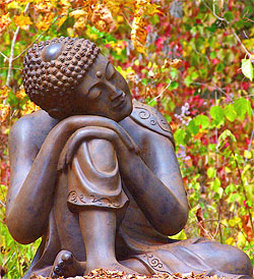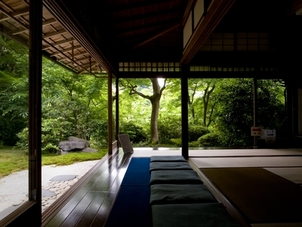How can psychotherapy or counselling help?
“Real fearlessness is the product of tenderness. It comes from letting the world tickle your heart, your raw and beautiful heart. You are willing to open up, without resistance or shyness, and face the world. You are willing to share your heart with others.” ― Chogyam Trungpa, Rinpoche
What is Buddhist psychotherapy and counselling?
|
Buddhist psychotherapists and counsellors match the tools and perspectives of western psychology with the Buddhist spiritual path. To do this requires that the therapist have a firm grounding in both of these traditions of self inquiry, and have integrated the two traditions enough to be able to offer a genuinely useful therapeutic and spiritual experience to their clients. Buddhist therapy goes beyond use of mindfulness (a secularised application of Buddhist meditation techniques), and can encompass a much broader range of Buddhist teachings. Below is a non-comprehensive list of some Buddhist teachings (dharma) that have relevance to psychotherapy and counselling.
|
Why would a Buddhist practitioner benefit from seeing a psychotherapist?
Buddhism is a complete path of spiritual or religious development that does not need psychotherapy to complete it. However, there are compelling reasons why Buddhist practitioners, particularly westerners practicing Buddhism, have been turning to psychotherapy in increasing numbers.
Many of these reasons for doing therapy revolve around relationships. Western Buddhists have ambitiously taken up the search for enlightenment, and have taken up some of the most advanced teachings and meditation practices that in Asia are largely the preserve of male celibate monastics. These monastics have benefited from the teachings of living communally, and seeing their own personal issues reflected in this context. They have also not had to deal with intimate partner relationships, sexuality, career issues, financial pressures, family life, and many other challenges that are part of normal Western life. Western life has it's own challenges that psychotherapy was developed to help with.
Influential Western Buddhist teachers such as Jack Kornfield have investigated why so many Westerners seem to get stuck spiritually in their development. The conclusions he, and many other Western teachers have reached, is that Westerners often have a lack of self acceptance that makes spiritual practice difficult. This lack of self acceptance is difficult for us to even recognise, because it is so normal in the West. The self may need to be explored, healed, and accepted, before we can let go of it.
Finally, there is what the famous Tibetan Buddhist Master Chogyam Trungpa called spiritual materialism. This is the inevitable tendency to use spiritual ideas and practices to strengthen our egocentricity, and further delude and trap ourselves. This is inevitable because our ego and our conditioning and bias influences our ability to make contact with the Buddhist teachings in a real and transformative way. A psychotherapist can serve as another perspective, someone who can see the things about yourself that your blindspots are hiding from you. Furthermore, the therapist actually has your permission to tell you these things about yourself, and has the skill and training to give this feedback in a way that is helpful.
Many of these reasons for doing therapy revolve around relationships. Western Buddhists have ambitiously taken up the search for enlightenment, and have taken up some of the most advanced teachings and meditation practices that in Asia are largely the preserve of male celibate monastics. These monastics have benefited from the teachings of living communally, and seeing their own personal issues reflected in this context. They have also not had to deal with intimate partner relationships, sexuality, career issues, financial pressures, family life, and many other challenges that are part of normal Western life. Western life has it's own challenges that psychotherapy was developed to help with.
Influential Western Buddhist teachers such as Jack Kornfield have investigated why so many Westerners seem to get stuck spiritually in their development. The conclusions he, and many other Western teachers have reached, is that Westerners often have a lack of self acceptance that makes spiritual practice difficult. This lack of self acceptance is difficult for us to even recognise, because it is so normal in the West. The self may need to be explored, healed, and accepted, before we can let go of it.
Finally, there is what the famous Tibetan Buddhist Master Chogyam Trungpa called spiritual materialism. This is the inevitable tendency to use spiritual ideas and practices to strengthen our egocentricity, and further delude and trap ourselves. This is inevitable because our ego and our conditioning and bias influences our ability to make contact with the Buddhist teachings in a real and transformative way. A psychotherapist can serve as another perspective, someone who can see the things about yourself that your blindspots are hiding from you. Furthermore, the therapist actually has your permission to tell you these things about yourself, and has the skill and training to give this feedback in a way that is helpful.
Tibetan Buddhism, Zen Buddhism, and Theravadin Buddhism in therapy
These three Buddhist traditions are the most commonly practiced by Western Buddhists (Theravadin Buddhism most often practiced in the form of the vispassana or insight meditation tradition.) Each is authentically Buddhist, has particular strengths, and also can sometimes by practiced by Westerners in a way that tends to have distinctive issues. Below are some generalisations which may or may not ring true for your or your experience. They are offered from a place of deep respect for each of the traditions, and those who practice them.
Zen Buddhist practitioners may be vulnerable to pefectionism. The Zen Buddhist tradition beautifully integrates working with the body, the arts, everyday (lay) life, and work. A side effect of this is that Zen practitioners may feel like they need to be good at everything (or may be attracted to the tradition with this belief already in place.) The drivenness which is part of the strength of Zen may benefit from being looked at in therapy.
Tibetan Buddhism may help practitioners develop a warmth and gentleness which is psychologically healthy. However, the elaborate esoteric side of this tradition can be a pitfall for those who are not deeply grounded, down to earth personalities before they start practice.
Theravadin Buddhism has the strongest emphasis of the three traditions on renunciation. For some people who already have issues in this area, this can develop into a troubled relationship with desire of all kinds, and a distant and cut-off relationship with the world.
Zen Buddhist practitioners may be vulnerable to pefectionism. The Zen Buddhist tradition beautifully integrates working with the body, the arts, everyday (lay) life, and work. A side effect of this is that Zen practitioners may feel like they need to be good at everything (or may be attracted to the tradition with this belief already in place.) The drivenness which is part of the strength of Zen may benefit from being looked at in therapy.
Tibetan Buddhism may help practitioners develop a warmth and gentleness which is psychologically healthy. However, the elaborate esoteric side of this tradition can be a pitfall for those who are not deeply grounded, down to earth personalities before they start practice.
Theravadin Buddhism has the strongest emphasis of the three traditions on renunciation. For some people who already have issues in this area, this can develop into a troubled relationship with desire of all kinds, and a distant and cut-off relationship with the world.
Our background as Buddhist psychotherapistsMichael Apathy and Selina Clare are qualified experienced psychotherapists in private practice in Christchurch, New Zealand. Between us we have 26 years of experience practicing mindfulness and meditation, including numerous intensive retreats and five years of full time residential monastic-style training at Zen Mountain Monastery in upstate New York. Michael has a bachelor degree in religious studies, which gives him a broad understanding of the Buddhist and other religious traditions. Selina specialises as a psychotherapist using mindfulness based therapy to treat stress and anxiety. Both of us have undertaken many years of our own personal psychotherapy and personal and spiritual development. If you're interested in or engaged with Buddhism as a spiritual or religious path, then we'd love to work with you, so please get in touch.
|
Specialty Areas |
Online BookingBook my first session.
If there are no bookable services showing via the online booking website, this means we currently have a waiting list for new clients. Please give us a call or email if you would like to add your name to it. |
Lucid Psychotherapy and Counselling, Christchurch provides affordable and effective individual psychotherapy, counselling, Intensive Short Term Dynamic Psychotherapy (ISTDP), ecotherapy, treatment for depression, stress, panic and anxiety disorders, and mindfulness mentoring, servicing the area of Ōtautahi Christchurch, Hokitika, Māwhera Greymouth, West Coast, Aotearoa New Zealand. We also offer online therapy sessions using video i.e., Zoom (telehealth). © 2015-2024 Lucid Psychotherapy & Counselling.


